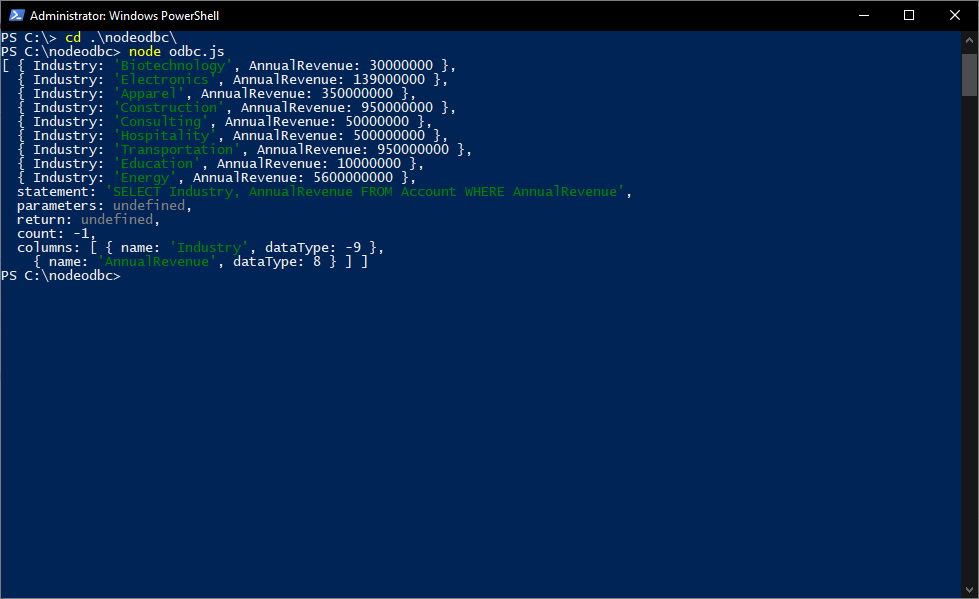Discover how a bimodal integration strategy can address the major data management challenges facing your organization today.
Get the Report →Query JSON Services through ODBC in Node.js
Use node-odbc to execute SQL queries against JSON services from Node.js.
Node.js is a JavaScript runtime environment that allows you to run JavaScript code outside of a browser. With the CData ODBC Driver for JSON, you can access live JSON services from Node.js apps and scripts. In this article, we walk through installing node-odbc and the required tools to create a simple Node.js app with access to live JSON services.
With built-in optimized data processing, the CData ODBC Driver offers unmatched performance for interacting with live JSON services in Node.js. When you issue complex SQL queries from Node.js to JSON, the driver pushes supported SQL operations, like filters and aggregations, directly to JSON and utilizes the embedded SQL engine to process unsupported operations client-side (often SQL functions and JOIN operations).
Connecting to JSON Services
If you have not already done so, provide values for the required connection properties in the data source name (DSN). You can use the built-in Microsoft ODBC Data Source Administrator to configure the DSN. This is also the last step of the driver installation. See the "Getting Started" chapter in the help documentation for a guide to using the Microsoft ODBC Data Source Administrator to create and configure a DSN.
See the Getting Started chapter in the data provider documentation to authenticate to your data source: The data provider models JSON APIs as bidirectional database tables and JSON files as read-only views (local files, files stored on popular cloud services, and FTP servers). The major authentication schemes are supported, including HTTP Basic, Digest, NTLM, OAuth, and FTP. See the Getting Started chapter in the data provider documentation for authentication guides.
After setting the URI and providing any authentication values, set DataModel to more closely match the data representation to the structure of your data.
The DataModel property is the controlling property over how your data is represented into tables and toggles the following basic configurations.
- Document (default): Model a top-level, document view of your JSON data. The data provider returns nested elements as aggregates of data.
- FlattenedDocuments: Implicitly join nested documents and their parents into a single table.
- Relational: Return individual, related tables from hierarchical data. The tables contain a primary key and a foreign key that links to the parent document.
See the Modeling JSON Data chapter for more information on configuring the relational representation. You will also find the sample data used in the following examples. The data includes entries for people, the cars they own, and various maintenance services performed on those cars.
Building node-odbc
In order to connect to JSON through the CData ODBC Driver, you need to build node-odbc manually (after installing the required tools).
Installing the Required Tools
The following commands install the tools required to build node-odbc (note the -g parameter, which installs the tools globally).
npm i -g windows-build-tools npm i -g node-gyp
Building node-odbc
After installing the required tools, create a directory for the Node.js app and install odbc (which builds the binary for us to use in our Node.js script).
mkdir nodeodbc cd nodeodbc npm i -g node
Querying JSON from Node.js
With the ODBC Driver installed, a DSN Configured, and node-odbc built, we are ready to query live JSON services from a Node.js app. The sample code below connects to a specific DSN and queries the people table.
myscript.js
const odbc = require('odbc');
async function queryJSON() {
const connection = await odbc.connect(`DSN=CData JSON Source`);
const data = await connection.query('SELECT [ personal.name.first ], [ personal.name.last ] FROM people');
console.log(data);
}
queryJSON();
Once you write the app, use node to execute the script:
node myscript.js

Download a free, 30-day trial of the CData ODBC Driver for JSON and start working with your live JSON services in Node.js. Reach out to our Support Team if you have any questions.






